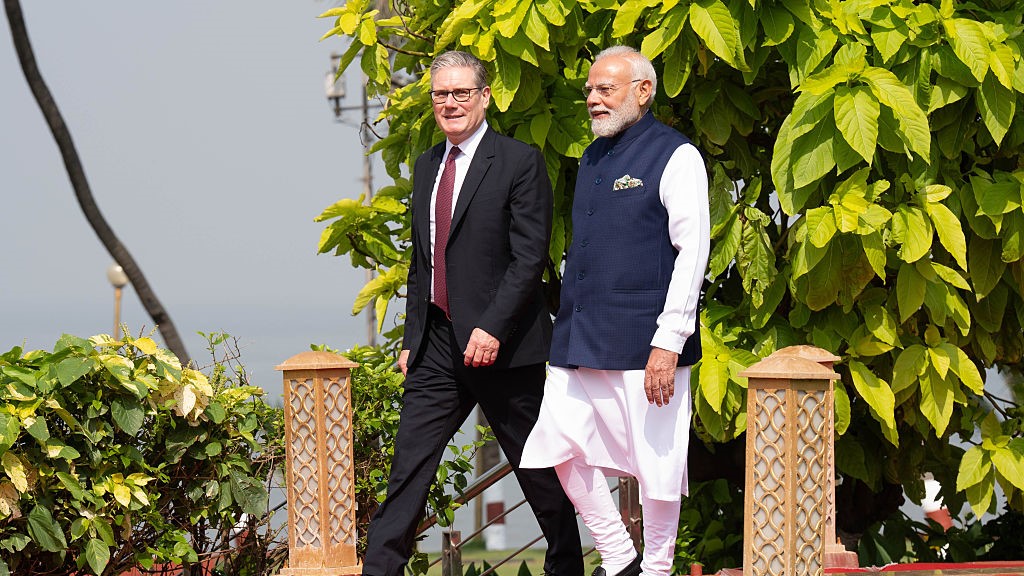UK Prime Minister Keir Starmer paid a two-day visit to India from October 8–9 at the invitation of Prime Minister Narendra Modi. The visit, Starmer’s first to India, followed PM Modi’s July trip to the UK, during which the two countries signed the India–UK Comprehensive Economic and Trade Agreement (CETA) and adopted the India–UK Vision 2035 and Defence Industrial Roadmap
Both leaders addressed the Global Fintech Fest in Mumbai on October 9 and held restricted and delegation-level talks, expressing satisfaction at the progress of the India‑UK Comprehensive Strategic Partnership. They reaffirmed their commitment to global peace, stability, and a rules-based international order and discussed global and regional issues of mutual interest.
Trade and investment
The Prime Ministers welcomed the CEO Forum meeting on the sidelines of the India‑UK Summit and urged early ratification of CETA. They also welcomed the resetting of the Joint Economic and Trade Committee (JETCO) to oversee the agreement and advance the broader trade and investment partnership.
The UK delegation highlighted investment opportunities across sectors including construction, infrastructure, clean energy, advanced manufacturing, defence, education, sport and culture, financial and professional services, science, technology, consumer goods, and food. The UK‑India Infrastructure Financing Bridge (UKIIFB), a partnership between NITI Aayog and the City of London Corporation, was cited as an example of sustainable growth collaboration.
The two leaders reiterated commitment to improving aviation connectivity and discussed renewal of the India‑UK Air Services Agreement and other aerospace matters.
Technology and innovation
PM Modi and the UK Prime Minister reaffirmed cooperation on frontier technologies under the Technology Security Initiative (TSI), including telecommunications, critical minerals, AI, and health technologies.
Under TSI, they announced:
* India–UK Connectivity and Innovation Centre for AI-native networks for 6G, Non-Terrestrial Networks, and telecom cybersecurity (£24 million initial funding).
* India–UK Joint Centre for AI to advance responsible AI applications in health, climate, fintech, and engineering biology.
* UK–India Critical Minerals Processing and Downstream Collaboration Guild, alongside Phase 2 of the Critical Minerals Supply Chain Observatory and a satellite campus at IIT‑ISM Dhanbad.
The PMs also highlighted biotechnology partnerships, including CPI UK with BRIC institutions, Henry Royce Institute with IISc, and Oxford Nanopore Technologies with BRIC-CDFD, targeting biomanufacturing, 3D bioprinting, and genomics.
Defence and security
The leaders agreed to expand military exchanges, joint exercises, and training. PM Modi welcomed the UK Carrier Strike Group port call and Royal Navy exercise KONKAN with the Indian Navy. Both committed to maritime security collaboration in the Indo-Pacific, including a Regional Maritime Security Centre of Excellence under the Indo-Pacific Oceans Initiative.
They welcomed progress on integrating Indian Air Force instructors into Royal Air Force training and expressed intent to finalize an India‑UK agreement on maritime electric propulsion systems for Indian naval platforms.
The PMs also agreed on an initial government-to-government supply of Lightweight Multirole Missile systems, supporting India’s air defence capabilities and long-term defence collaboration.
Both condemned terrorism and violent extremism, committing to counter radicalisation, terrorist financing, cross-border movement of terrorists, misuse of emerging technologies, and terrorist recruitment. They strongly condemned the April 2025 Pahalgam attack in Jammu and Kashmir.
Climate and energy
Prime Minister Modi and Starmer reaffirmed collaboration on net-zero goals and welcomed the India‑UK Climate Finance Initiative. They announced joint investment in a Climate Tech Start-up Fund under an MoU with the State Bank of India and formation of an Offshore Wind Taskforce, with potential collaboration through the Global Clean Power Alliance.
Education, culture, and people-to-people ties
The Prime Ministers emphasized youth, cultural, and educational exchanges. They committed to the first Annual Ministerial Strategic Education Dialogue and implementing the Programme of Cultural Co-operation.
Progress on UK university campuses in India was noted: University of Southampton (Gurugram), University of Liverpool, York, Aberdeen, Bristol, Queen’s Belfast, Coventry (GIFT City), Lancaster University (Bengaluru), and in-principle approval for University of Surrey (GIFT City).
They reaffirmed implementation of the Migration and Mobility Partnership and acknowledged the Indian diaspora in the UK as a living bridge between the countries.
Regional and multilateral cooperation
The leaders reaffirmed commitment to global peace, prosperity, and a rules-based international order, supporting UN Security Council reform and India’s permanent membership aspirations. They highlighted the Commonwealth and agreed to collaborate on climate change, sustainable development, and youth engagement.
Both expressed support for a just and lasting peace in Ukraine and stability in the Middle East, welcomed the US Gaza peace plan, and committed to securing a ceasefire, release of hostages, delivery of humanitarian aid, and a two-state outcome with a safe Israel and viable Palestinian state.
Starmer thanked PM Modi for the hospitality. The visit reaffirmed the strong growth and positive trajectory of the India‑UK Comprehensive Strategic Partnership, based on shared democratic values and deep bilateral friendship.










